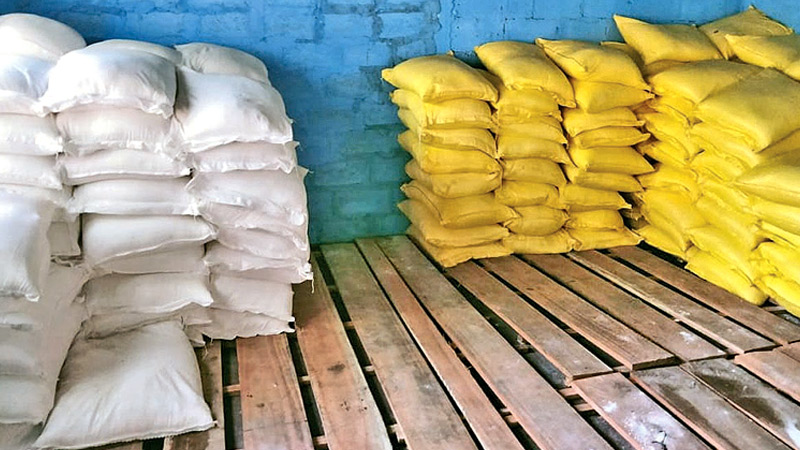For the first time two local entrepreneurs in Hambantota have come forward to manufacture and export Pure Dried Vacuum Salt (PVD) using 100% local technology.
 PVD salt is heavily used for the biscuit, sausage and other food industry and the total requirement was imported. Sensing that this product can be manufactured locally and to promote the ‘Made in Sri Lanka’ concept the government banned imports recently opening the doors for local enterprisers to fill this vacuum.
PVD salt is heavily used for the biscuit, sausage and other food industry and the total requirement was imported. Sensing that this product can be manufactured locally and to promote the ‘Made in Sri Lanka’ concept the government banned imports recently opening the doors for local enterprisers to fill this vacuum.
“This is a step taken in the right direction by the government as the annual import bill of PVD salt is around Rs. 13 billion, ‘’ the two joint Managing Directors, H. W. Asanka and D. Ravi Anderson of Ceylon Natural Salt Pvt. Ltd. said. The duo speaking to ‘Daily News Business’ said that with few modifications to the present salt PVD salt could be made locally and hence they decided to exploit this vacuum.’
With a marketing background and doing intensive research on YouTube and other global manufactures, the two entrepreneurs first started developing a machine. PVD salt, unlike traditional salt, has to be very pure and should be 100% sand free.”
“We met several leading local machinery manufactures and forwarded our idea but they were not keen or could not come up with a usable model. Some of them even did not take us seriously.”
Finally we disclosed our idea to Krishan Motors in Hambantota who first said he would like to experiment with us and finally made a PVD salt machine to match our requirement.
The two youth said that an imported PVD machine would cost around Rs. 500 million with the current shipping charges but they managed to build this machine for then Rs. 75 million after several trial and error stages. “We discarded around 5 machines in this trial and error process and must sincerely thank Krishan Motors for staying with us until we succeeded.”
New technology
They explained that heat sources such as fire wood and heavy use of electricity are usually used to power the machine but instead they developed a scheme to send a ‘heat wave’ to produce PVD salt.
“Firstly we take bulk salt and melt it into liquid form. This process brings sand and other substances to the bottom and then we take the top pure salt layer of liquid and use a heating technique to remake salt. Then using another machine we crush it again to make PVD salt to international standards.”
 He said they also buy ‘bulk’ salt from Lanka Salt to manufacture PVD salt after going through legal bidding processes.
He said they also buy ‘bulk’ salt from Lanka Salt to manufacture PVD salt after going through legal bidding processes.
“However since we are confident and have a readymade local and overseas market we now hope to invest in our own Salt manufacturing plant. For this we have identified an abandoned salt factory of a lending and diversified product manufacturing and distributing company and are negotiating to take it on a long lease.”
Asanka and Anderson said that traditionally salt is harvested two times a year. “But our research has found that harvesting can be done six times a year with modifications and new technology due to the climatic conditions of Hambantota, ideally suitable for salt production.”
“We have observed that if we invest in Puttalam we can harvest around 12 times per year and we are looking at this opportunity as well.”
White Gold
He said that though many think salt is a profitable industry, globally it is considered a ‘white gold’ industry due to its multiple uses especially for industrial use and low cost of production.
“We are already experiencing this as our exports are yielding higher profit margins than expected and our ROI will be in less than a year.”
Asked if they are going in for their own branding they answered in the negative. “We prefer to supply in bulk to our local suppliers and exporters who use their own branding.”
“However currently we are receiving direct orders from Canada and Australia and we may look at branding and commence direct exports from next year.”
PVD import ban justified
They also thanked the government for taking the right decision to ban the import of PVD salt and saving millions of foreign exchange to Sri Lanka. “Yes some of the local food industry had a temporary setback due to this ban. But now they are using our products which are cheaper for them as well.”
Due to this PVD salt import ban the country not only saved millions of dollars but has also opened up a new industry vertical, job creation and most importantly added a new product to the local export basket and reversed the export/import being the trend setters in this segment.



There is 1 Comment
Regarding pvd salt
Add new comment